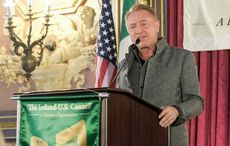Although actress S'nead Cusack was born into one of Ireland's most noted theater clans, she never took it for granted. The daughter of Cyril and Maureen Cusack, two of the most beloved actors the country ever produced, she spent many years climbing out of their shadows and forging her own career. For Cusack, like so many Irish before her, finding her independence meant moving abroad - in her case to England - where she became a member of the Royal Shakespeare Company in 1975, fulfilling a lifelong dream. A star in every sense of the word, Cusack quickly won plaudits and plum roles on the London stage, where she cut a dash as one of the most beautiful and beguiling actors of her era. High profile romances with legendary men like the footballer George Best and Oscar winning actor Jeremy Irons (whom she married in 1978) followed. But at all times, through all the media scrums and all the articles in the press, she maintained a dedication to her craft that has made her one of the most accomplished actors now working. "I was educated as Gaeilge," (meaning in the Irish language) Cusack tells the Irish Voice. "I went to Scoil Lorcan in Monkstown, Co. Dublin. During those years I had no sense my parents were famous. I knew that I went to the theater more than most children because that's where my father worked and my mother ran the company for a long time. But I didn't know it made us any different to anyone else. "Then I went to a convent boarding school in Killiney, and there I did become aware of it. We never had any money for a start, my clothes were second hand and the girls in my school were very posh. So I began to notice then," says Cusack, laughing at the memory. "But my mother educated me that we were artists and that artists very often had to make sacrifices for their art. Then gradually it dawned on me that my father was known and loved, and that I was his daughter." Having a famous father is usually advantageous, but it can also be a drawback if you're carving a career in the same business. "My father was my own criteria for excellence and so there was no way to match up," says Cusack, laughing again. "It was difficult. When I started to climb out of his shadow I had to leave Ireland, really. "When I went across the water I started to work and make my way. But for years I carried the heading Cyril Cusack's daughter in every piece of newsprint written about me." Cusack is currently in New York starring in director Sam Mendes' production of Chekov's "The Cherry Orchard" at the Brooklyn Academy of Music (BAM). Mendes, the Oscar winning director of American Beauty and Revolutionary Road (starring his wife Kate Winslet) has received accolades for his intensely class-conscious production in which Cusack stars as the doomed aristocrat Liubov Andreeva Ranevskaya. Set in Russia just after the turn of the 20th century, the events that unfold in The Cherry Orchard look as fresh today as when they were written. We're looking at a family that is in way over their heads with mortgage repayments. When Ranyevskaya returns to her ancestral home after spending years abroad she's just months away from losing it to foreclosure. It could hardly be a more timely theme. Everyone in Chekov's seriously funny play is talking about money, moaning about losing it, trying to make it or just asking flat out asking for it. No one, however, seems to be getting what they want. "We had an audience of our sponsors in from Bank of America last week," Cusack says, chuckling. "I thought to myself, God, it must be extraordinary to be a banker in these times and then come to watch a play like 'The Cherry Orchard.'" She's referring to the scenes in the play where the ominous peasantry surround the upper classes as if the revolution was about to break out that instant. What kind of chilling message would the Bank of America crowd take from that? Cusack has a starring role in what BAM calls its Bridge Project, a cross-Atlantic experiment in classic theater that pack productions with first-rate Irish, English and American actors and then ferries them around the world. "I'm against borders in any shape or form, so working like this appeals to me. There's a hodgepodge of Irish, British and American actors here and I love that," she says. "Accomplished performers like Rebecca Hall and Ethan Hawke. Acting companies should observe no borders. But I don't like that they're calling us the Brits. I get really pissed off about that. I'm not a Brit. I'm Irish." As the character Ranyevskaya, one of Chekov's greatest creations, Cusack plays a woman who is a mass of contradictions. She's innocent yet conniving, loving yet casually cruel, filled with heartache and longing and at the same time almost completely superficial. But her worst flaw turns out to be a common one. Her refusal to see what is staring her in the face. Says Cusack, "There's something about the complexity that Chekov gives his characters, you can never get to the bottom of it. I've always wanted to play Ranyevskaya because I understand her contradictory nature. There's an innocence and purity to her, but side by side with that she's also a carless monster. And she doesn't know she's doing it." In many ways - and especially in Mendes' thoughtful production - Ranyevskaya actually symbolizes her whole class. She simply cannot or will not see what is beyond her own experience, or what lies beyond the privileged bubble she lives in. Compare her financial recklessness with our own Wall Street crowd and you'll see how little changes. In the play Ranyevskaya can't understand why she has to sell the Cherry Orchard, in the same way our own Wall Street CEOs can't understand why the public are shocked they gave themselves huge bonuses last month. On stage Cusack can actually feel that the play and its timely theme is reaching the audience. "Acting is the shy man's revenge, so you're constantly seeking reassurance that it's reaching the audience, but I think this play is. I can feel that it is," she says. It's been decades since they were an item, but press interviewers still routinely ask Cusack about her affair with George Best, one of the greatest footballers, or soccer players, as Americans would say, in the history of the game. The lingering fascination isn't hard to understand, though Best passed away in 2005. When the affair happened, back in the mid 1970s, both of them were young and beautiful. There was a mystique surrounding Best that Cusack easily matched. As they say in Ireland, they were well met. Although reporters have routinely asked her to divulge the story, to date she has never given them a word about the man or what he meant to her. "Now this is shocking," she says, laughing heartily again. "Here I am at age 60 and I had a relationship with a footballer when I was twentysomething. It's appalling really, that I haven't lived it down. "I never talk about George. I was asked many questions when he died and I didn't answer a single one, on television or in the press, so I probably won't now, but you can ask away if you want to." Responding to the suggestion that Best was a particularly bright symbol of hope in an increasingly dark time for the country, Cusack agrees. "I won't talk about it simply because I don't, but I will say I am very glad that I knew him." The note of tenderness in her voice was unmistakable. "The Cherry Orchard" is now playing at the Brooklyn Academy of Music (BAM). For tickets call 718-636-4100.




Comments